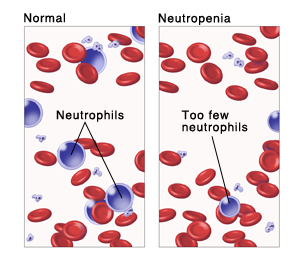
Neutropenia? What is this? What causes this problem? Is it curable? What are the signs and symptoms? How can homeopathy help you? All of this and more answered, in this post and of course our doctors always there to help you. Just fill in your details in the form down below and we will answer all your questions for FREE!

Q1. What is neutropenia?
Neutropenia is a condition in which the neutrophil cells get lowered in blood. Neutrophil cells are the type of white blood cells which helps to fight against infections in the body.
Neutrophils play a very important role in the body’s defense mechanism against infections. An absence or scarcity of neutrophils (a condition called neutropenia) makes a person vulnerable to infection.
Q2. What is the normal range of neutrophils?
The normal range is 1.5 to 8.0 (1,500 to 8,000/mm³).
Q3. What percentage of neutrophil is normal?
A range between 38% and 80% of the WBC. The percentage is often increased during an infection (bacterial or viral). A low number (neutropenia) increases the risk of bacterial infection.
Q4. Common causes of neutropenia?
Neutropenia may be caused by numerous medical conditions including:
-congenital disorders of the bone marrow,
-cancer chemotherapy,
-infections,
-certain medications (drug-induced neutropenia),
– auto-immune disorders.
Q5. Symptoms of low white blood cells?
-Redness.
-Swelling.
-Pus formation (at the site of an injury or incision)
-A cough.
-Sputum.
-Nasal discharge
-Fever of low grade or high grade
-Frequent infections.
-Frequent infections can leads to :
-ulcers.
-Diarrhea.
-Burning urination
-A sore throat.
-recurrent sinusitis and otitis.
Q6. Is low white blood count serious?
A low white blood cell count puts you at higher risk for infections — typically bacterial infections. Causes for the reduction in the white blood cells occur from benign disorders, vitamin deficiencies, leukemia or lymphoma.
Q7. What deficiency causes neutropenia?
Both benign and malignant hematopoietic diseases cause neutropenia. For example, vitamin B12 and folate deficiencies cause not only neutropenia but also anemia and thrombocytopenia.
Q8. Side effects of low blood count?
-Prone to recurrent Infection or higher risk of developing an infection.
-Anemia
-Bleeding
-fever of 100.5 °F (38 °C) or high-grade fever
– a cough or a sore throat
-diarrhea
-ear pain, headache or sinus pain
-skin rashes, etc.
Q9. Is neutropenia a symptom of cancer?
Neutropenia is related to cancer and cancer treatment as it lowers down the level of neutrophils which affects the bone marrow, such as leukemia, lymphoma, and multiple myeloma.
Q10. What diseases cause neutropenia?
Diseases that causes neutropenia are:
-Aplastic anemia,
-Hematologic malignancy (ex: leukemia, lymphoma, myelodysplasia, myeloma) and
-Ionizing radiation.
Q11. How to investigate neutropenia?
-Complete blood count.
-Differential white blood cell count.
-Peripheral blood smears.
-Antinuclear antibody.
-Rheumatoid factor.
-Liver function tests.
-Peripheral blood flow cytometry.
-The t-cell rearrangement for T-cell clonality.
-Paroxysmal nocturnal hemoglobinuria testing.
-Antineutrophil antibodies.
-CT scan of the abdomen is helpful to detect splenomegaly.
-Urinalysis.
-Urine culture and sensitivity.
-Sputum Gram stains and culture.
-Stool for Clostridium.
-Skin biopsy.
Q12. Treatment for neutropenia?
-Antibiotic therapy.
-Colony-stimulating factor therapy for granulocyte colony- stimulating factors (G-CSF).
-Transfusion of granulocytes.
-Corticosteroid therapy.
-Correction of nutritional deficiency is detected.
-Splenectomy and other surgical procedures.
Differential diagnosis:
-Autoimmune diseases.
-Chronic myelomonocytic leukemia.
-Congenital neutropenia.
-Cyclic neutropenia.
-Drug induced neutropenia.
-Large granular lymphocytic leukemia.
-Pseudoneutropenia.
-Large granular lymphocyte leukemia.
-Cytomegalovirus.
-Granulocytopenia.
-Viral hepatitis.
-Infectious mononucleosis.
-Non-Hodgkin lymphoma.
-Systemic lupus erythematosus.
-Wegener granulomatosis.
-Bacterial sepsis.
-Aplastic anemia.
-Acute lymphoblastic leukemia.
-Acute myelogenous leukemia.
-Folic acid deficiency.
-Multiple myeloma.
For more information, you can visit Cancer.net and Wikipedia.